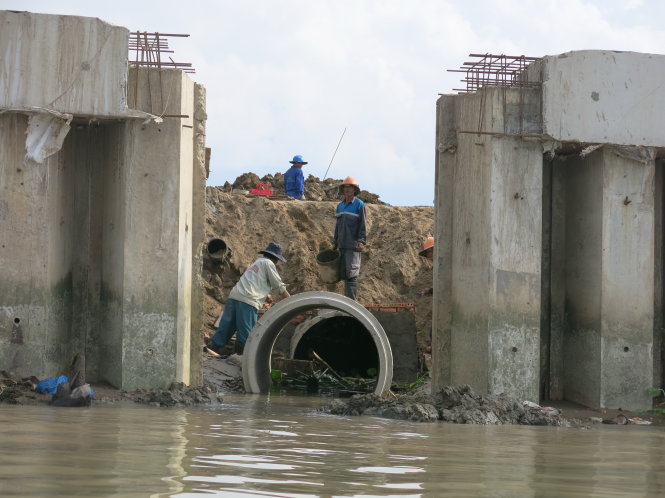As a Hong Kong-invested paper mill in the southern Vietnamese province of Hau Giang is poised to test its operation despite questionable waste treatment solutions, local scientists have demanded a halt to the plan.
The Lee & Man complex, a US$628.7 million project developed by the Vietnamese unit of Hong Kong’s Lee & Man Paper, should only be allowed to start the trial-run once it has had an adequate waste treatment plan, according to local experts.
The complex, located by the Hau River, one of the most important waterways in the Mekong Delta in southern Vietnam, has a 420,000 metric ton a year packaging paperboard plant, which is near completion and is scheduled to undergo a test run.
The developer previously announced that they would add a toilet paper mill to the project on a later date.
A Lee & Man representative has said that construction of the paperboard plant, the wastewater treatment system and a thermal power plant within the complex “has been basically finished,” and the company is “speeding up completion of other tasks to soon enter a trial-run.”
One of the unfinished tasks is the construction of a 40,000 cubic meter reservoir to store wastewater before dumping it back into the Hau River, as requested by the Ministry of Natural Resources and Environment, according to the representative.
 The wastewater treatment area of the plant
The wastewater treatment area of the plant
The paperboard plant is expected to discharge 20,000 cubic meters of wastewater a day, with Lee & Man obtaining a wastewater dumping license in 2015.
Associate Professor and Doctor Phung Chi Sy, director of the Environmental Technology Center, which was hired to prepare a new environmental impact assessment for the Hong Kong developer, said the 2015 license remains legally valid, so “[it] will not have to seek any permission for the upcoming trial-run.”
The Environmental Technology Center is working on an environmental impact assessment to replace one the developer obtained back in 2008, whose content is now outdated in relation to changes in the project.
Sy said the new report will be available by the end of this month.
Scientists’ concern
The Lee & Man paperboard plant is expected to use 17 types of chemical for its production, ten of which are said to have “average and high toxicity,” said Professor Le Huy Ba, former head of the Institute of Environmental Science, Engineering and Management.
“These chemicals are extremely harmful for humans, seafood and the environment if they are not properly treated,” Ba told Tuoi Tre (Youth) newspaper.
In the meantime, Associate Professor and Doctor Le Trinh, head of the Institute for Environmental Science and Development, said the plant may use sodium hydroxide (NaOH) and chlorine (Cl2) in bleaching pulp, which will result in a chemical compound known as 2,3,7,8-Tetrachlorodibenzo-p-dioxin.
“This is the most toxic chemical compound humans can produce,” Trinh underlined.
The professor added that this dioxin compound can concentrate on sediments before penetrating aquatic animals and finally, people who eat them.
“With a daily wastewater output of 20,000 cubic meters, the amount of dioxin dumped into the Hau River every year will be huge,” he concluded.
“I do not believe this paper project will not severely pollute the Hau River.”
Lee & Man has admitted that even though its treated wastewater meets standards, it “cannot be retrieved for use as a kind of household water,” according to a company document obtained by Tuoi Tre.
 The Lee & Man plant is located by the Hau River.
The Lee & Man plant is located by the Hau River.
Professor and Doctor Vo Tong Xuan, a seasoned agricultural expert, said he is also concerned that the Hau River will be ‘killed’ by wastewater from the Lee & Man plant.
However, he admitted that it is not possible to ask the developer to cease the project “because the plant is not commissioned and the anticipated pollution has not occurred yet.”
Xuan therefore suggested that the government ask the developer to guarantee that they would strictly follow all requirements for wastewater treatment and environmental protection.
“In that guarantee, the company should accept that they have their plant closed if they are found dumping untreated wastewater into the environment,” he said.
Dr. Duong Van Ni, an ecological expert at Can Tho University, recommended that the Hau Giang administration order Lee & Man to delay the trial-run until they completely resolve all environmental concerns around the project.
Like us on Facebook or follow us on Twitter to get the latest news about Vietnam!

















































